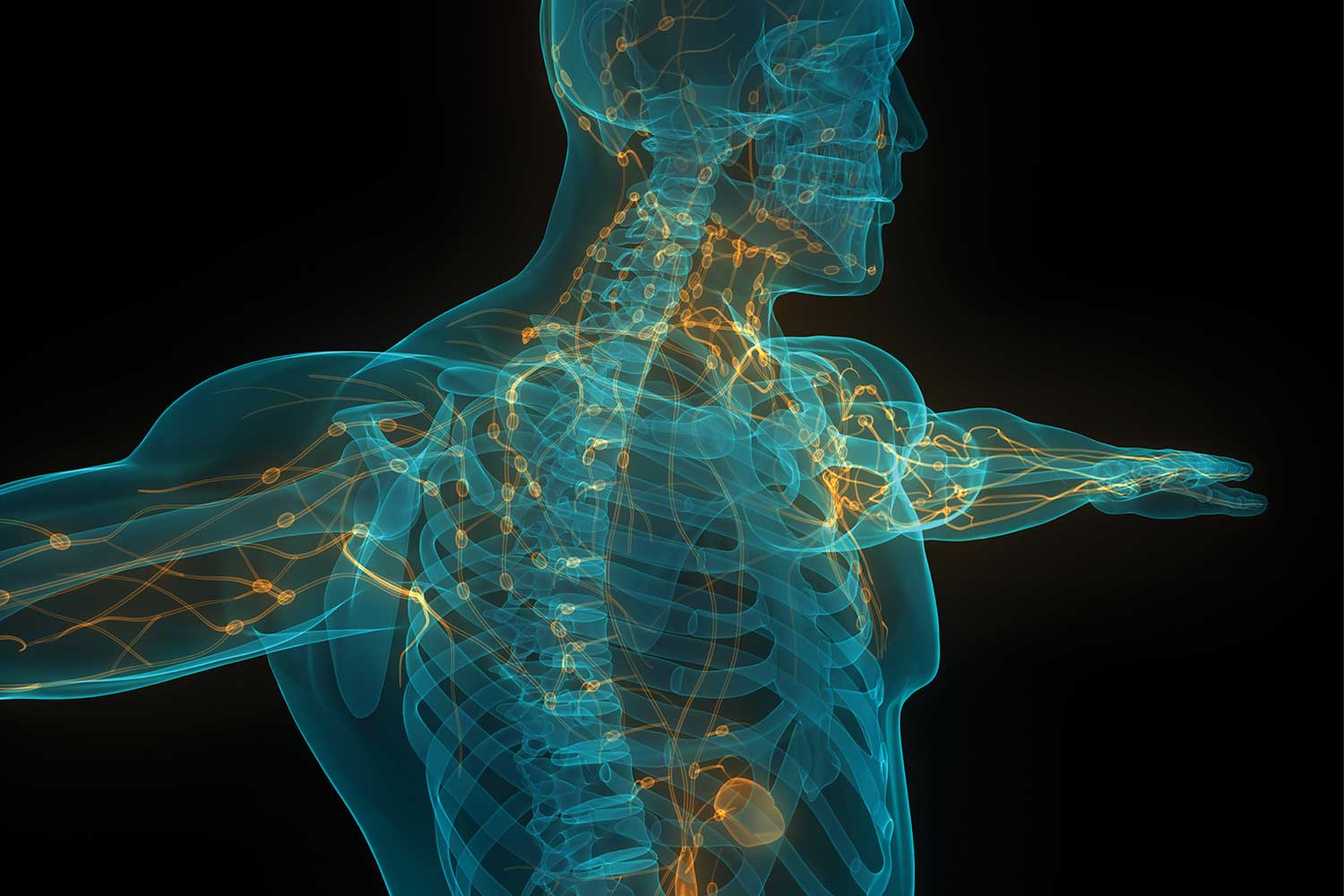
Issue 38 / May 2021
Women in Medicine
Inspirational Women of NUS Medicine
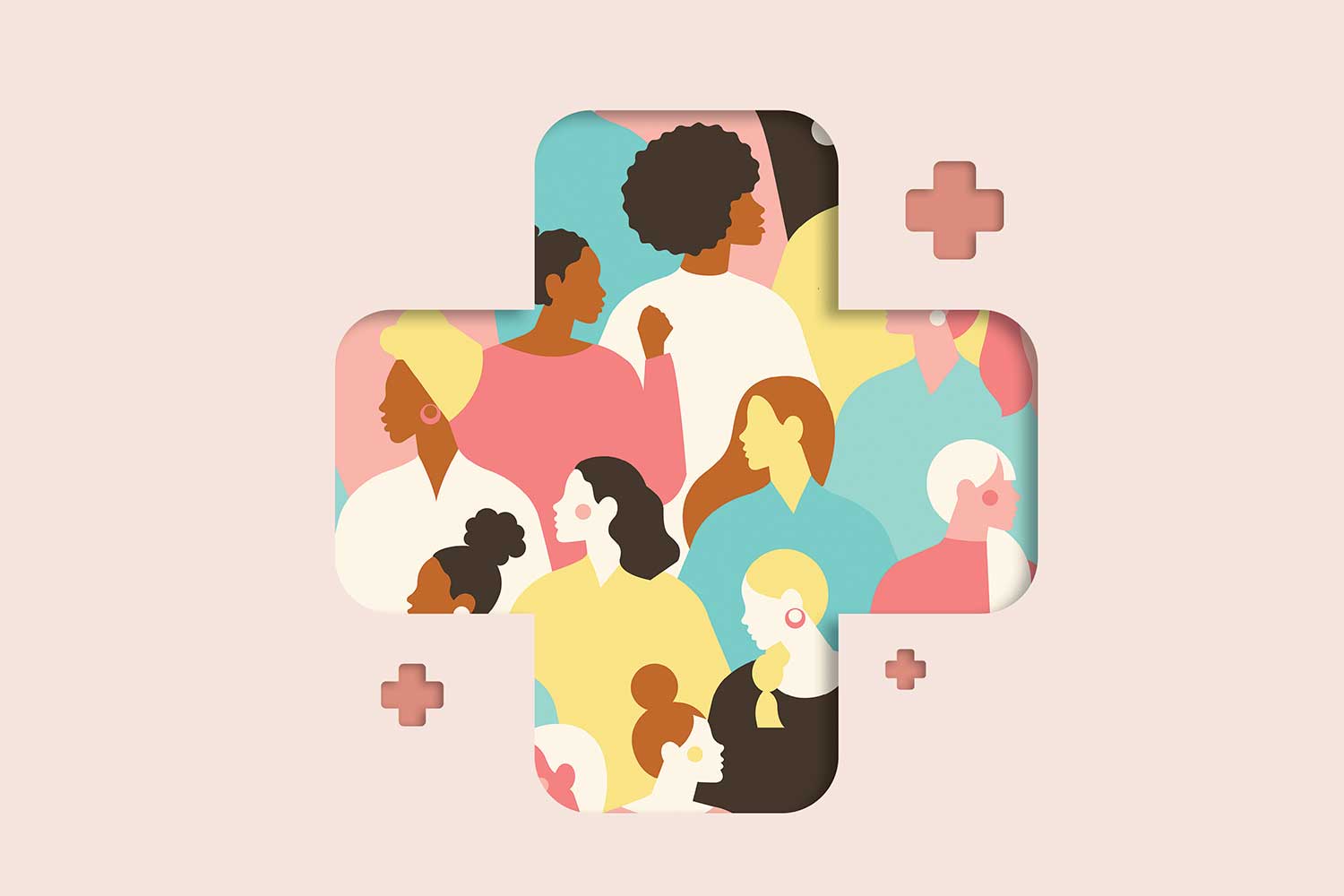
Women hold up half the sky, China’s Mao Tse-tung once famously declared. Singapore marked 2021 as the Year of Celebrating SG Women, to acknowledge and hail women’s immense contributions to the country. Five alumnae share what motivates them.
|
Class of 1983 |
Prof Leo Yee Sin: Fighting the Good Fight
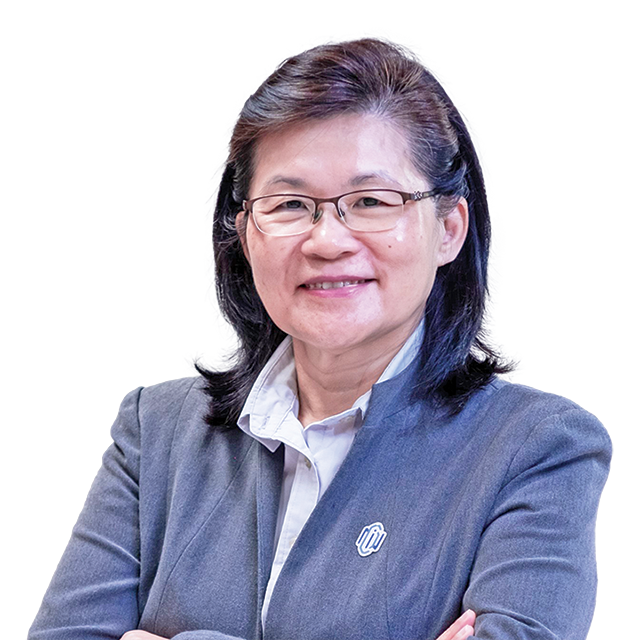
About:
Prof Leo Yee Sin is an Adult Infectious Disease specialist and is the Executive Director of the National Centre for Infectious Diseases. Her clinical interests are HIV Medicine, Communicable Diseases, General Infectious Diseases and Outbreak Disease Management.
P
rof Leo Yee Sin confessed she felt “a bit of anticipation, a little bit of uncertainty, and a little bit of anxiousness” as she waited for the novel coronavirus to arrive in Singapore back in January 2020.
All in a day’s work
In a year defined by how the COVID-19 pandemic is affecting the lives of one and all, Prof Leo, Executive Director of the National Centre for Infectious Diseases (NCID), has spent every waking moment leading her team in the fight against the virus. With more than three decades of experience working in infectious diseases, Prof Leo oversees the NCID’s efforts in clinical services involving patient-care; public health units that include laboratory testing and epidemiology studies; research; training and education; and community outreach.
She is no stranger to dealing with mysterious pathogens, having led her team through multiple outbreaks in Singapore, notably the Nipah outbreak in 1999 and Severe Acute Respiratory Syndrome (SARS) in 2003, which claimed 813 lives worldwide and 32 in Singapore1. Prof Leo’s work on SARS saw her conferred with the Public Service Star.
While her efforts at helping to contain COVID-19 have drawn kudos again—she received the Public Administration Medal (Silver) at the National Day Awards in August last year, and the BBC included her in its list of 100 inspiring and influential women in 2020—it is Prof Leo’s work in caring for HIV patients that set her on the path to a life dedicated to fighting infectious diseases.
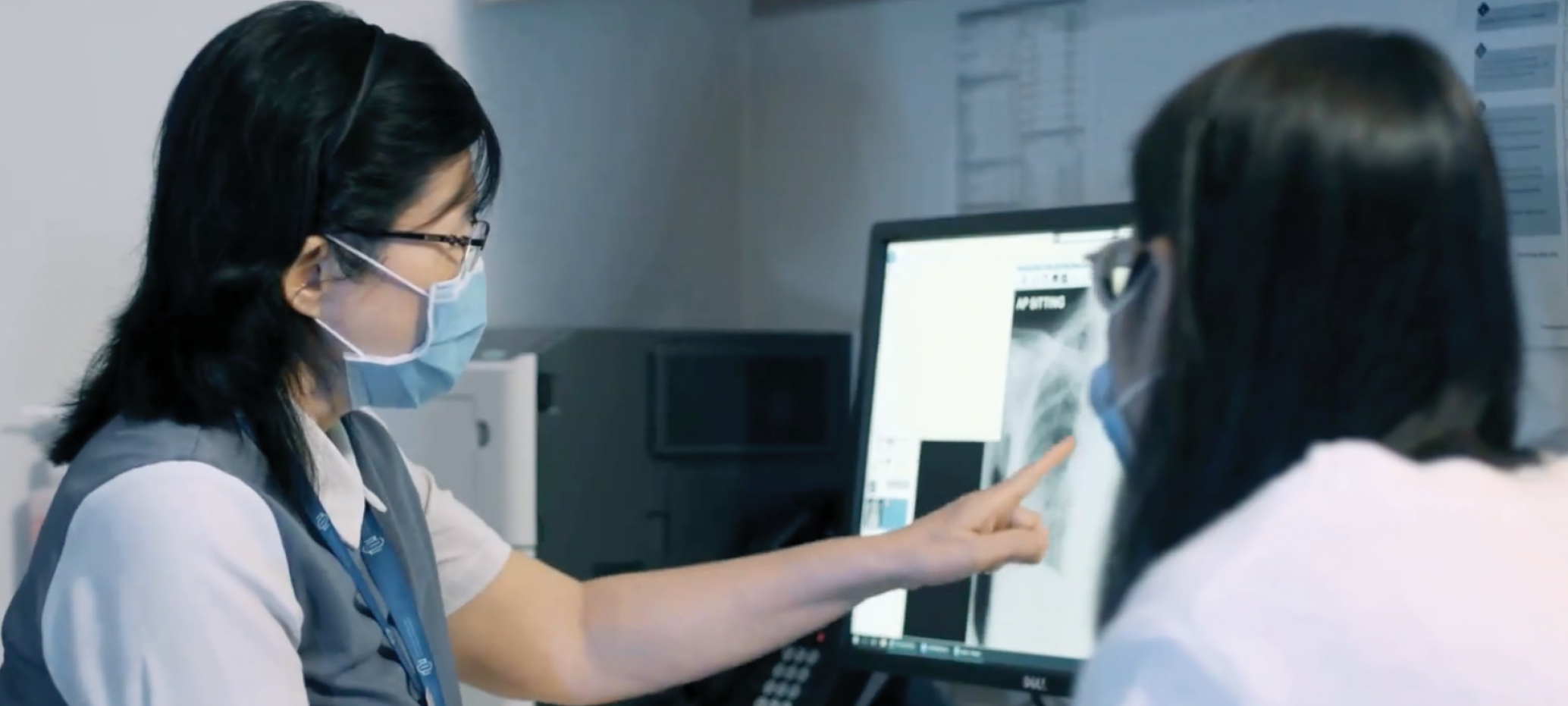
Championing the health of the marginalised
“I started my infectious disease training in 1989, when the HIV epidemic in Singapore began. Case numbers at that point were very small, but the people with HIV were badly affected by the disease. Many of them were very young, and basically their future and careers were completely damaged by HIV,” Prof Leo recalled.
She was undergoing her clinical fellowship training in California, where she cared for mostly patients with HIV/AIDS, and picked up a fair bit about the management of acute complications of the disease. “When I came back from my clinical fellowship, the situation in Singapore remained relatively unchanged. I decided that I could use my knowledge to give better quality care to the HIV population then, motivated by the room for improvement I saw in HIV management.”
Working in HIV/AIDS in the early days was challenging and healthcare workers felt underappreciated. “It was a very gloomy period for HIV medicine,” Prof Leo explained, “There was no access to medication, and no access to subsidised care.”
The situation is different now. Prof Leo mused, “I think people began to understand more about HIV, and a lot has changed. Medications are now universally accessible, and the available treatments have vastly improved the outlook of a typical patient’s condition.”
She remains firmly convinced that she made the right decision to step into this “very challenging” area of healthcare.
“Once you put in the commitment to care for HIV patients, the conviction to continue is very strong. As a result, you have a very dedicated team, who will support one another and do almost everything to fight against discrimination and inequality.”
“Once you put in the commitment to care for HIV patients, the conviction to continue is very strong. As a result, you have a very dedicated team, who will support one another and do almost everything to fight against discrimination and inequality,” affirmed Prof Leo, who continues to care for HIV patients, some of whom have been consulting her for the past 20 to 30 years. Providing that kind of long-term care for people in need requires commitment. It is also a practice that, like all the rest of the medical specialties, offers much scope for growth and development. “Medicine is a very challenging field… there are opportunities for individuals to develop and aspire to, and I will strongly encourage them to put extra effort to excel in their own field and own career.”
She is not a fan of multitasking or hurried decision-making. Her approach to work is to focus on one thing at a time. “I think it’s important to stay calm, and I prefer to think three times before acting on something. Keeping calm also allows you to analyse, crystallise thoughts and make better judgement calls. Thinking ahead also means having ready solutions so that you can respond and be flexible to situational changes.”
|
Class of 1978 |
Prof Yap Hui Kim: A Heart for Kids with Kidney Disease
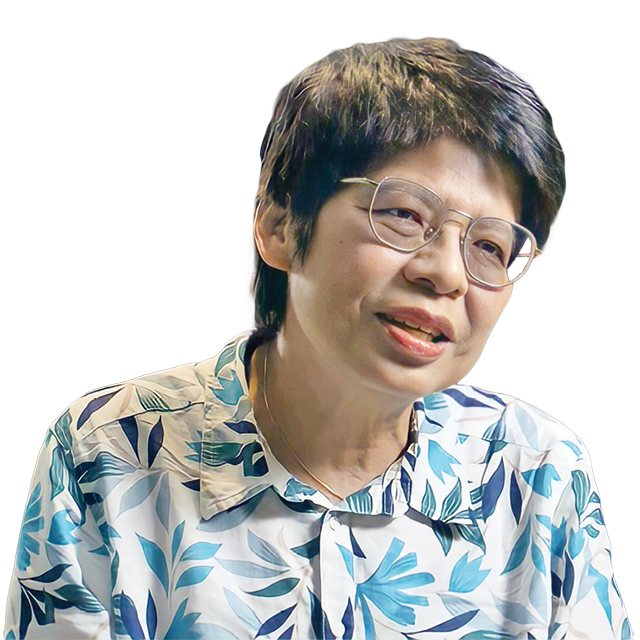
About:
Professor Yap Hui Kim is a Professor in Paediatrics at the NUS Yong Loo Lin School of Medicine and Head and Senior Consultant, Division of Paediatric Nephrology, Dialysis and Renal Transplantation at the Khoo Teck Puat – National University Children’s Medical Institute, National University Hospital.
I
have only met Prof Yap Hui Kim once before today’s interview. We had met her for a discussion on a research paper that we were planning to publicise, but which was eventually put paid to by the pandemic. She struck me as a serious doctor who would not tolerate any nonsense.
It is on this warm, sunny morning in June that we meet again. The mood is tentative as we have just come out of the two-month circuit breaker.
She cuts an unassuming figure as she walks briskly into the room and plonks herself down in a chair. I motion for the make-up artist to start doing her make-up.
Despite the early morning rush, Prof Yap is as chirpy as the proverbial lark.
I tell her that she may want to retain the powder and mascara that had been applied (very lightly) for the interview. She laughs and tells me that she is allergic to some cosmetic products, and they may make her eyes swell.
I silently pray in my heart that this is not going to happen today.
We usher her to the room once her hair and make-up are done. To warm up, we get her to talk about her field of expertise—kidney disease—and how it happens in children. There is no stopping her after that.
She candidly challenges the traditional perspective of medical treatment being an end in itself.
“Having the diagnosis of kidney disease can be devastating to the family. We need to help them understand that the kind of treatment that we give to the child is to help them lead a normal, active life.
“The key is patient outcome. If the child wants to go to school and we haven’t done enough to help him achieve the desired outcome, then we would have done nothing.
“We have to ask ourselves what is medicine for. Giving medication is part of the process of helping the family reach their desired outcome. Without the medicine, they don’t feel well enough to go to school. If we don’t help them, they might never finish school, so we need to help by giving families that extra leg up.
“If we don’t see the patient as the centre of why we are there, then it becomes just a job. You really have to put your patient first and ask yourself what you can do better.”
“The crux of chronic disease management is more than just giving medication. It is about ensuring that the children and families are able to achieve the outcomes they desire.”
The passion is apparent as she continues.
“If we don’t see the patient as the centre of why we are there, then it becomes just a job. You really have to put your patient first and ask yourself what you can do better.”
We turn the conversation to the annual camp that she has been organising for the children since the turn of this century, under the auspices of the Shaw-NKF-NUH Children’s Kidney Centre which she runs.
Her eyes light up.
“One of the things we do at the centre is that we run an annual camp every year. A three-day camp, like the school camps, we bring these children together so that we can run leadership programmes for them. At the same time, my doctors and nurses are there to ensure medical safety.”
She pauses and chuckles: “I am the chief advisor, the big busybody of the whole camp.”
She regales us with heartwarming stories of a patient whom she sees since he was 12, and who wants to pay it forward by helping to organise these camps.
“One of the things that we want to show them [the children] is that they are as good as their peers in school. This is important for their self-esteem,” adds Prof Yap, on why these camps are important to the children, who are on dialysis.
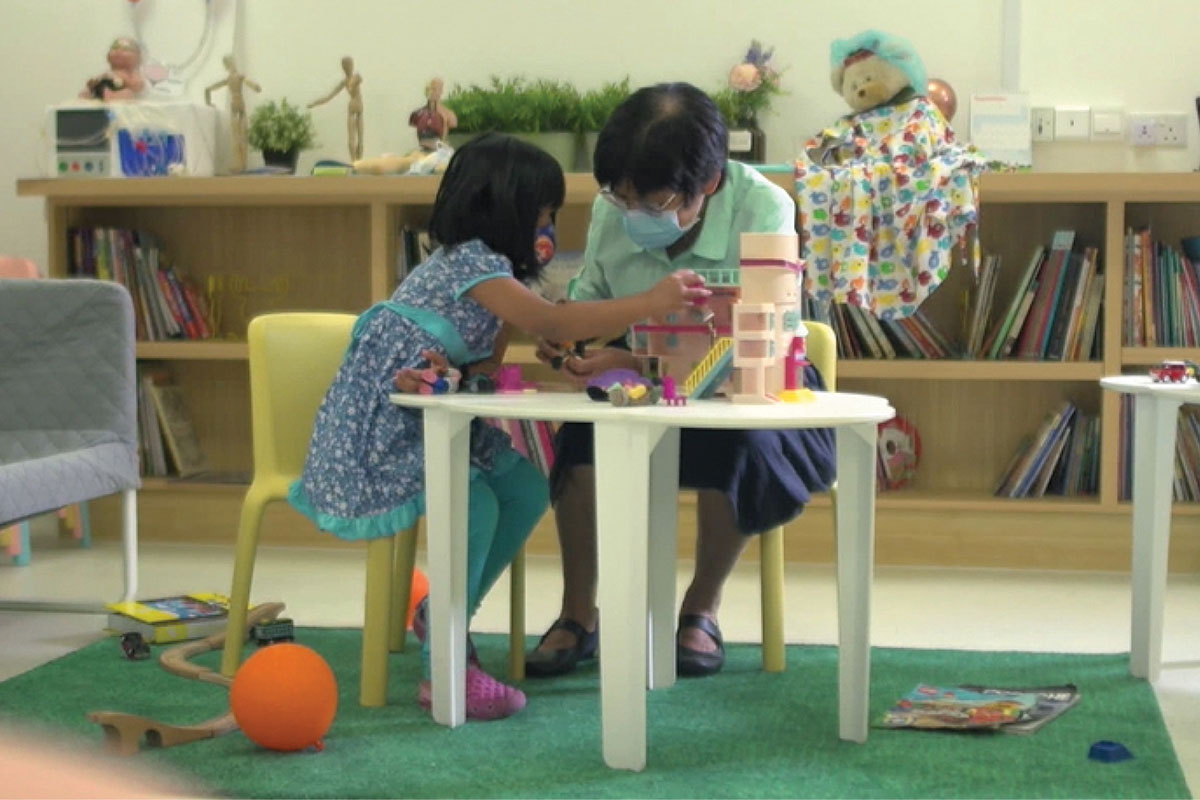
We ask her to talk about her hobbies, and she enthusiastically recounts how bird-watching became a part of her life.
“It was the fault of an English Paediatric nephrologist. I was a young lecturer at the university and he was coming here to to teach the Masters of Medicine in Paediatrics. I picked him up at the airport, and he asked, where can I go to watch birds? So I said, Jurong Bird Park.”
She laughs.
“He stared at me and said, I don’t mean the park. He explained to me what bird-watching was all about and I thought he was a bit nutty. In the end we went to Sungei Buloh. When I first saw the eyes of the birds through the binoculars, I couldn’t believe there were so many colours. It was really very pretty. I introduced it to my sister and we actually enjoyed seeing the different colours.”
Our conversation goes on for more than an hour, but Prof Yap shows no sign of impatience.
I have met many eminent and prolific clinicians in my short two years here. A few of them have left a deep impression on me, not so much for their outstanding achievements, but for their authenticity and humanity.
Prof Yap is one of them. Her genuine and compassionate demeanour bring so much hope to this world, and most certainly to her patients. Her passion and devotion to medicine is as infectious as it is inspirational.
I note that Prof Yap is from the class of 1978—the year I was born. I think most people would call this trivial or even silly, but somehow it brings a smile to my face that I have that little connection, no matter how small, to a role model like her.
|
Class of 1974 |
Dr Geh Min: Healing Holistically
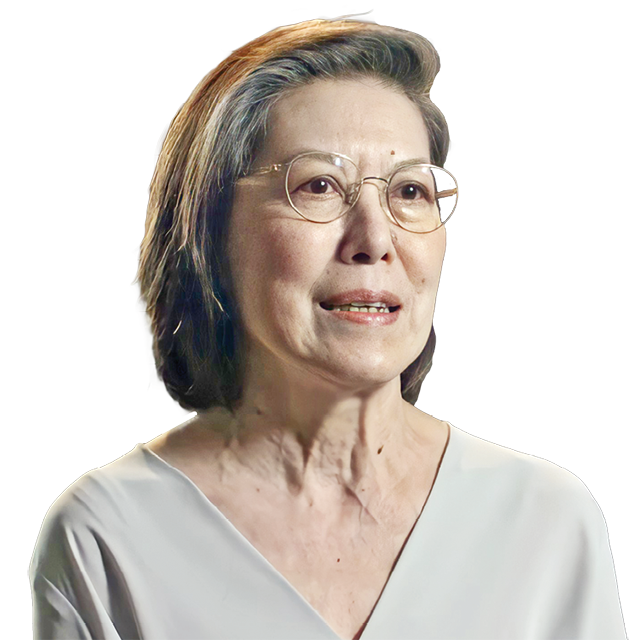
About:
Dr Geh Min is an ophthalmologist and eye specialist at Mount Elizabeth Medical Centre. She was also a Nominated Member of Parliament from January 2005 to April 2006. In 2000, she became the Nature Society’s first female president and remained at its helm until 2008.
D
r Geh likens her first brush with ophthalmology to love at first sight; it was a magical moment that was followed by deep consideration for the practical prospects. As someone who loved working in a hands-on environment, surgery was an exciting choice. “It is not life-saving, but it is sight-saving. That, to me, is very important,” she states.
The first two years of medical school were a drag for her. With rote memorisation, test tube experiments and peering into microscopes, she wondered if she had made the right decision to pursue medicine. However, when she entered her clinical years, everything started to make sense—the path she had chosen would enable her to apply her knowledge and help people get better.
Throughout her career as a doctor, she emphasised the importance of the doctor-patient relationship. She realised that while technology could be applied in fulfilling her commitment as a doctor to her patients, it is a good servant and a bad master. With each innovation helping to do things more efficiently, it remains critical to her that she never loses that “human touch” with her patients.
“If we allow things to deteriorate or change to the extent where the patient can just go to an instrument and get everything done without any other human interference, it shows that we have neglected this doctor-patient relationship.”
With so much technology at our fingertips today, Dr Geh feels that to remain human, we need to have a lifeline to the humanities; this is especially so for doctors. To her, this is the best way to continually connect with those around us.
Referring to the humanities as a type of technology that allows the individual to more effectively tap on emotions to reach out to another, Dr Geh advocates for the greater inclusion of humanities into medical education. With research showing the patient benefits of alternative treatments like music therapy and art therapy, she believes that the administration of such therapies would also be beneficial to doctors and doctors-in-training.
This belief also stems from her appreciation for nature: she finds solace in being outdoors, gazing at the sky or trees.
As the President of Nature Society Singapore from 2000 to 2008 and a Nominated Member of Parliament from 2004 to 2006, Dr Geh championed environmental causes. Many questioned her impetus for doing so; she was a medical doctor after all. She explains it this way, “To me, there is absolutely no contradiction or discrepancy—I am not just treating the disease, I am looking at the patient holistically. You cannot have a healthy person in an unhealthy environment. (The natural environment) takes you out of yourself and restores something in you. I think it is very important for everyone’s mental, emotional, psychological and physical health.”
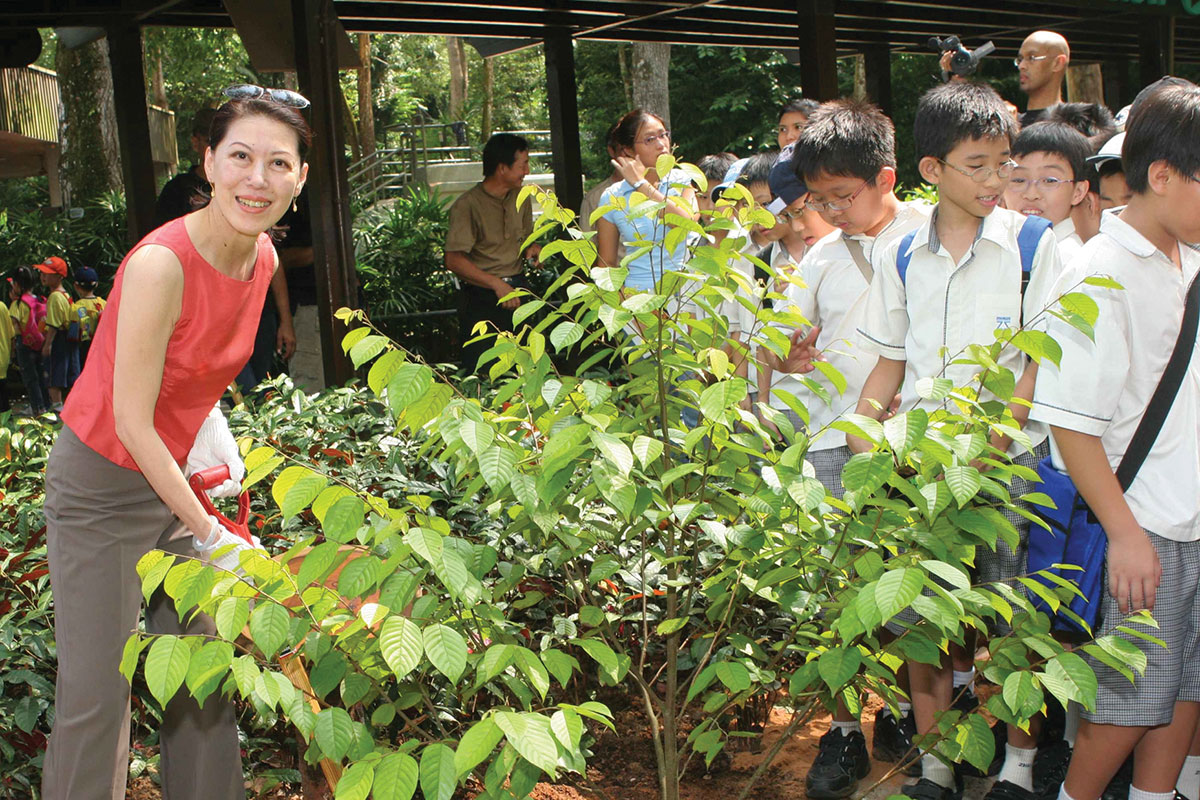
Photograph taken before implementation of COVID-19 safe distancing measures.
|
Class of 2015 (PHD) |
Dr Lim Su Fee: Nursing the Community
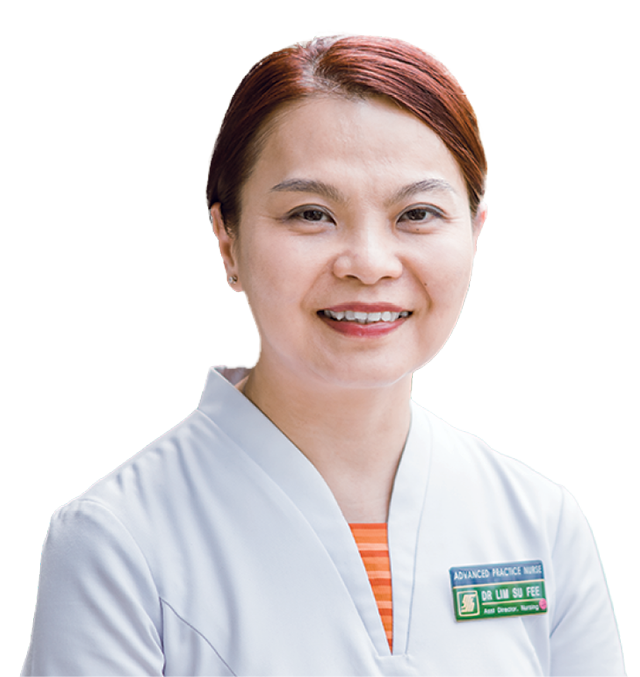
About:
With 30 years of experience in nursing, Dr Lim Su-Fee, Advanced Practice Nurse (APN) and Deputy Director of Nursing, Rehabilitation Medicine and Community Nursing, Singapore General Hospital (SGH), believes that the practice of medicine is not just about treating a disease, but also comforting patients and soothing their spirits. The alumna from the Class of 2015 (PhD), NUS Alice Lee Centre for Nursing Studies, explains the role of an APN, and how it epitomises the expansion, evolution and progression of nursing in Singapore.
T
he seeds of passion for nursing that grew in Dr Lim were first sown through a story about rambutans. When she was once hospitalised in her younger days, she shared the same ward as an old woman who repeatedly requested for rambutans. Her delight was palpable when one of the nurses came into the ward with a bag of rambutans and a warm smile. The thoughtful gesture from the nurse moved Dr Lim, who witnessed the episode from just a few beds away. “The incident left a deep impression on me, as I saw how a nurse’s simple act of kindness helped make a patient happy in the last days of her life.”
Dr Lim began her career in nursing at SGH in 1992, where she developed a special interest in caring for people who had suffered a debilitating illness or injury, requiring rehabilitation. She desired to help patients lead lives of quality beyond regaining their functionality. “It’s not enough to keep someone alive, as it is not just about treating the disease. We want to help them attain a good quality of life, and push them to their full potential.”
To specialise as an APN in rehabilitation medicine, Dr Lim pursued further studies at various overseas institutions and enrolled in the Master of Nursing course in the Department of Graduate Medical Studies at NUS Medicine in 2006. She also obtained a PhD in Nursing in 2015.
One of the most versatile and autonomous nursing roles today, the role of an APN demonstrates how nursing in Singapore has evolved over the years. “Previously, nurses had always been perceived as assistants to the physicians. Today, APNs can examine and diagnose patients, order tests, initiate and evaluate treatment, and even prescribe medicine, in collaboration with physicians. We also conduct research, lead clinical programmes, and teach at academic institutions.” Aside from rehabilitation medicine, Dr Lim leads a community nursing initiative at SingHealth, where a team of 34 community nurses provide healthcare services to a cohort of residents with conditions that range from pre-frail to end of life.
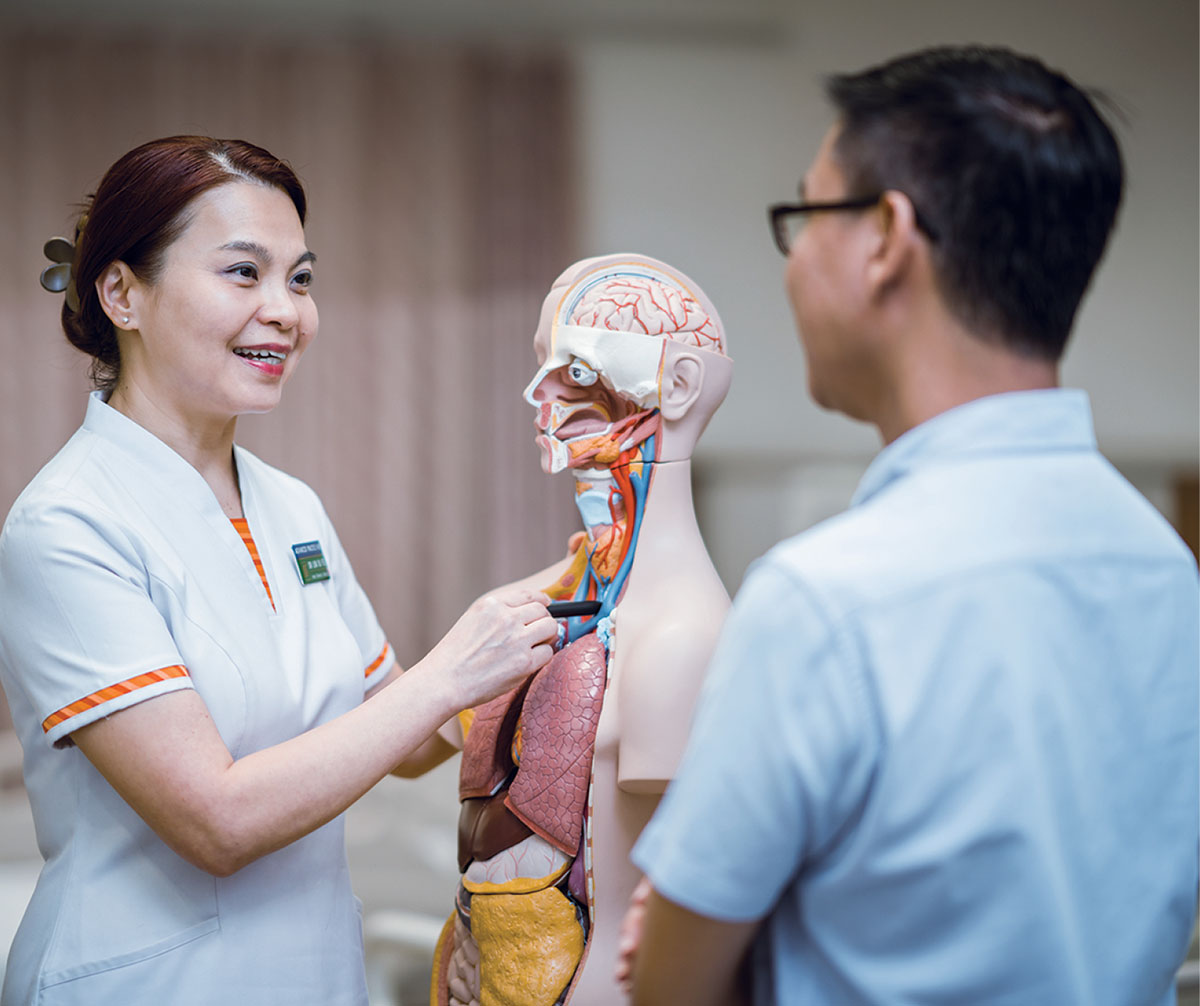
Photograph taken before implementation of COVID-19 safe distancing measures.
To ensure that there is timely intervention to keep residents well, community nurses trained in specialties are sited within neighbourhoods for residents to have easier and quicker access to healthcare. These nurses provide healthcare services such as health assessments, health coaching and monitoring of chronic diseases, medication management, and coordinate with other health and social care agencies to provide necessary support for the residents. These services are provided at the community nurse posts located within the community or residents’ homes.
“…it is important to understand that some elderly residents can be extremely vulnerable—they are prone to falls, take their medication incorrectly, not understand their condition or treatment, and even forget their medical appointments. That is why having community nurses is critical.”
Setting up the programme was however, a challenging process which involved convincing several stakeholders. “We were often questioned on whether there was a need to embed nurses in the communities when people could just go to clinics and see a doctor. But it is important to understand that some elderly residents can be extremely vulnerable—they are prone to falls, take their medication incorrectly, not understand their condition or treatment, and even forget their medical appointments. That is why having community nurses is critical,” explained Dr Lim.
Being in the community allows nurses to better understand the living conditions of the residents, and they are then able to provide more effective care to help their patients manage their health conditions. Dr Lim once had an elderly patient whose health condition was exacerbated by the pet parrot he had at home. “When he visited the clinic, we could just tell him to remove the pet so that his condition can be well-controlled. But when we visited his home, we realised that the pet was his only companion. So we decided to instead teach him how to handle the pet’s feedings, as his parrot helps keep him going and motivates him to live for another day.”
These experiences have strengthened Dr Lim’s conviction of the importance of community nursing, She hopes the programme to eventually expand to the whole of Singapore, with nurses forming an integral part of the community, and are welcomed by residents as they go about their daily lives in the neighbourhoods.
|
Class of 2020 |
Dr Sarah Tham: Caring for the Down And Out
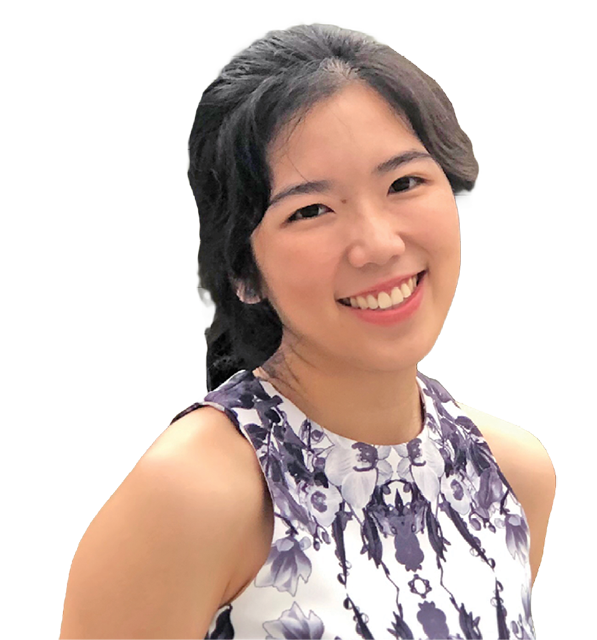
About:
Dr Sarah Tham—NUS Medicine alumna (Class of 2020), recipient of the Lee Hsien Loong Award for Outstanding All-Round Achievement 2020, and currently a House Officer at the KK Women’s KK Women’s and Children’s Hospital—is constantly relearning that true healing does not necessarily come through clinical therapy, offering hope and comfort can also work wonders.
“E
veryone has an expressive urge. But it’s particularly pronounced in those who pursue medicine. It’s like being a soldier. You’ve seen great and terrible things.” That quote by writer Ethan Canin, a physician, was in Dr Tham’s head when she entered medical school.
She counts it a privilege to be able to meet and connect with people from all walks and stages of life, at their moments of greatest need, grief and suffering—and yet celebrate with them in their moments of joy.
“People still fall ill, and people still pass away. And sometimes the best thing that we can actually offer is a simple thing. Like a word of comfort.”
Serving the underserved and forgotten had always been a passion for this NUS Medicine alumna. As a medical student, she had actively sought opportunities to serve her local community and communities beyond. These included volunteering with Assisi Hospice to care for the dying, tutoring children from broken families at Chen Su Lan Home, participating as a case writer at her local Meet-the-People sessions, and working with Healthserve to organise health screenings for migrant workers in their own dormitories.
Having previously picked up sign language, Dr Tham co-founded the club SIGNapse to teach healthcare students sign language and engage with the deaf community. Since its inception in 2016, SIGNapse has taught more than 1,000 medicine, nursing, pharmacy and dentistry students. It offers free interpretation services at health screenings, greatly facilitating communication for the hearing impaired.
“In medicine we can only cure sometimes, but we treat often and we can comfort always.”
While a student at NUS Medicine, Dr Tham also served as the director of the Public Health Service (PHS) in 2017. The student-led PHS organises the largest annual student-run health screening in Singapore. That year, PHS served approximately 1,100 Singaporeans with its comprehensive free screening and follow-up programme.
Outside of Singapore, Dr Tham is also actively involved in medical missions and humanitarian work in places like Ipoh (Malaysia), Kathmandu (Nepal), Nagaland and Lucknow (India), and Sangkhlaburi (Thailand). She has worked with children with HIV, victims of sex trafficking, lepers rejected by their families, refugees and minority groups. She says she wants to serve in rural populations where basic healthcare and sanitation needs are unmet. That led her to head a team of students and doctors to the slums in Lucknow in 2018. During the trip, they worked with a local organisation to provide education, women’s empowerment programmes and healthcare for slum dwellers.
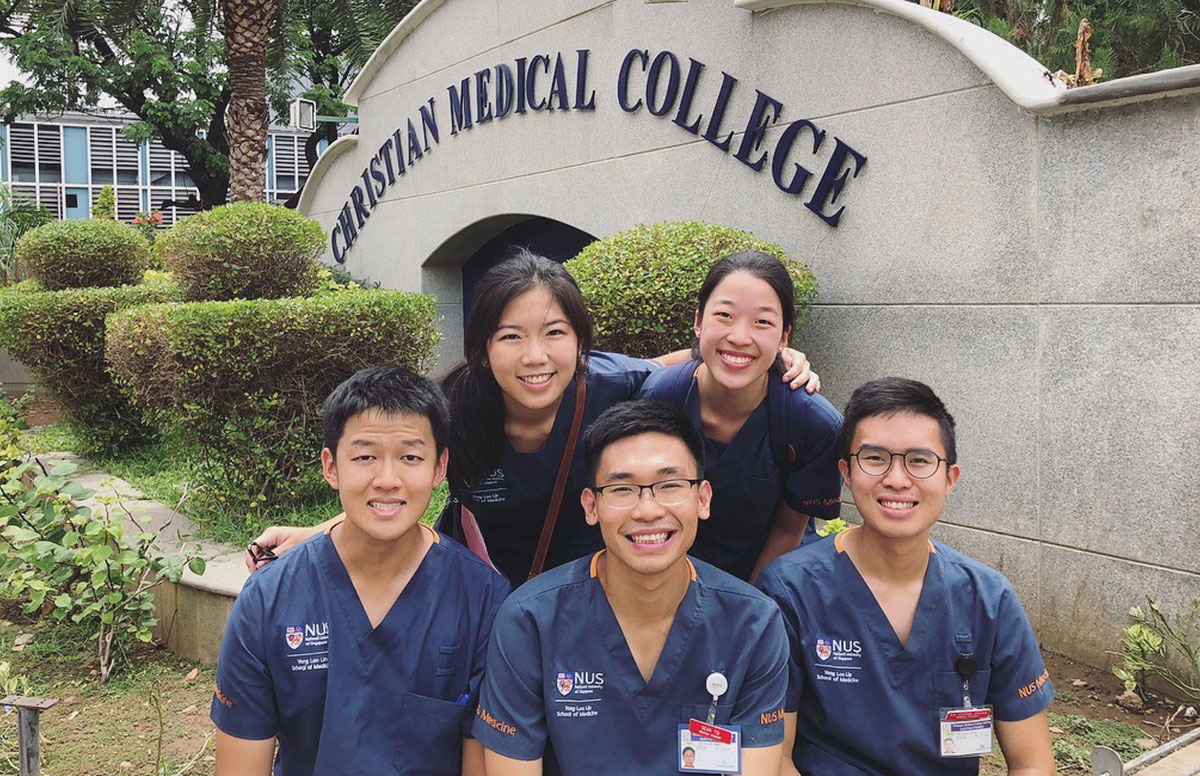
Photograph taken before implementation of COVID-19 safe distancing measures.
Dr Tham believes that such experiences are humbling. Rather than just training the mind, they train the heart to grow in compassion. She is constantly relearning that true healing does not necessarily take the form of medicine and surgery. It can be as simple as offering comfort and hope to a broken spirit.
In 2020, Dr Sarah Tham was awarded the Lee Hsien Loong Award for Outstanding All-Round Achievement. The award recognises outstanding academic and non-academic achievements of post-secondary students, particularly those who have made outstanding contributions to the community and demonstrated the spirit of innovation and enterprise.
-
From “Cumulative Number of Reported Probable Cases of SARS” https://www.who.int/csr/sars/country/2003_07_11/en/, accessed 5 March 2021.



